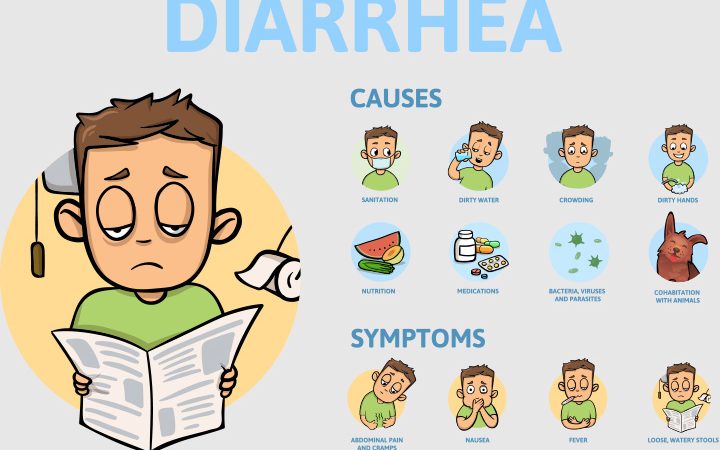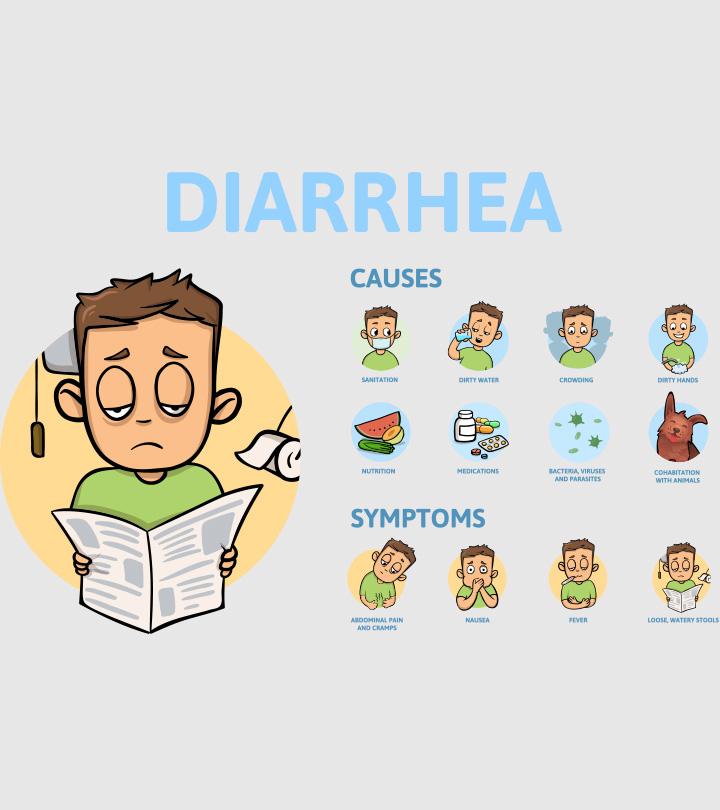If a child is passing more than three loose, watery stools a day, it is diarrhea. Diarrhea isn’t a disease, rather a symptom. of illness (1). Generally, viral gastrointestinal infections are its most common cause. However, some underlying diseases, such as celiac disease, may also cause it.
Diarrhea in children can be acute, persistent, or chronic and can be mild or severe, depending on the underlying cause. In most cases, diarrhea resolves on its own within three to four days. However, its timely treatment and management are crucial, especially in young children who can lose fluids rapidly, since it may lead to severe dehydration.
Keep reading to know the types, causes, treatment, possible complications, and prevention of diarrhea in children.
Types Of Diarrhea In Children
Diarrhea is usually categorized into the following three types (2).
- Acute (short-term) diarrhea: Lasts for one to two days and then resolves on its own.
- Persistent diarrhea: Lasts for more than two weeks and less than four weeks.
- Chronic (long-term) diarrhea: Lasts for four weeks or longer.
Usually, acute diarrhea is more common than the other two diarrhea types. However, how long diarrhea will last depends on its cause.
Symptoms Of Diarrhea
Passing loose, watery stool three or more times a day is the main symptom of diarrhea. Children could also have one or more additional symptoms (3).
The severity of diarrhea and the accompanying symptoms can vary from one child to another and depend on the underlying cause.
Causes Of Diarrhea In Children
The causes of acute and persistent diarrhea are usually different from those of chronic diarrhea. Here’s a brief overview of the causes of acute and persistent diarrhea (4).
Common causes of acute and persistent diarrhea
- Dietary changes: Certain foods, such as fruits and their juices, contain fructose, which can have laxative effects in high amounts. Thus, consuming large amounts of these foods can cause gastrointestinal disturbance, especially in young children, resulting in diarrhea.
- Viral infections: Viral gastroenteritis or stomach flu is the most common cause of diarrhea in children. There are several different types of viruses that can cause viral gastroenteritis. The most common ones are norovirus, rotavirus, adenovirus, and astrovirus (5).
- Bacterial infections: Campylobacter, Escherichia coli (E. coli), Salmonella, and Shigella are common bacteria that cause bacterial infection. The consumption of food contaminated by these bacteria can cause symptoms of gastrointestinal infection (food poisoning), such as diarrhea.
- Parasitic infections: Parasites are microbes that stay in or on their host and derive food from the body for survival. A child can get a parasitic infection when they consume foods or drinks contaminated with parasites. Some of the parasites that cause diarrhea include Cryptosporidium enteritis, Entamoeba histolytica, and Giardia lamblia.
Children who travel frequently can experience traveler’s diarrhea caused by consuming contaminated food or drinks. Also, children staying in daycare centers and those swimming in lakes and ponds are at a higher risk of contracting infections that cause diarrhea.
Common causes of chronic diarrhea
Unlike acute and persistent diarrhea, chronic diarrhea happens due to diseases or disorders (6).
- Chronic infections: Most microbial infections resolve with prompt care and treatment. However, sometimes they may turn severe, and some children may experience problems digesting carbohydrates or proteins in foods. Due to these issues, the children can have prolonged diarrhea.
- Food allergies and intolerances: Milk, egg, and peanut allergies and fructose and lactose intolerance are some conditions that may affect a child’s digestive system and cause diarrhea. When a child eats food to which they are allergic/intolerant, they get diarrhea with other symptoms, such as abdominal cramps.
- Digestive tract problems: Inflammatory bowel disease (ulcerative colitis and Crohn’s disease) is a digestive tract issue where chronic gut inflammation affects proper digestion. It can cause the affected person to experience chronic diarrhea with abdominal pain and weight loss.
Besides these, abdominal surgery and chronic use of certain medicines, such as antibiotics and antacids, may also cause chronic diarrhea in children.
Diagnosis Of Diarrhea In Children
Diagnosing acute diarrhea doesn’t require tests. However, if a child shows signs of dehydration, the doctors may order blood tests to determine the extent of dehydration. If the child has blood in stools, the doctor may order a stool test or stool culture to identify the specific cause. However, in many cases, the precise cause of acute diarrhea isn’t identified (3).
If a child has persistent or chronic diarrhea, the doctor may order the following tests to determine the cause (3).
- Blood test: Blood tests can show a child’s nutritional status, assess dehydration level, and determine if the child has inflammation in the body.
- Stool culture: A stool culture helps identify the exact microbe, that is, bacteria, virus, or parasite causing chronic diarrhea.
- X-ray: An X-ray can help detect liver and gastrointestinal tract problems that may be contributing to diarrhea.
Your healthcare provider may also order upper endoscopy and/or colonoscopy to access the inflammation site, perform a biopsy, and collect a sample. These tests help diagnose the precise cause of chronic diarrhea.
Treatment For Diarrhea In Children
The treatment for diarrhea depends on its type (acute or chronic), severity (mild or severe), and accompanying symptoms, such as fever or vomiting. Generally, children with mild, acute diarrhea and no vomiting need no medication or dietary changes. Children with mild diarrhea with vomiting, persistent diarrhea, or chronic diarrhea may require the following treatments (7) (8).
1. Dietary changes
The child may be required to shift to a soft diet containing easily digestible foods, such as soup and rice, to give rest to their digestive system. Additionally, you need to feed them more fluids, such as buttermilk and coconut water, to keep them hydrated. Once vomiting reduces, resume feeding your child an age-appropriate, well-balanced diet consisting of fruits, vegetables, meat, unsweetened yogurt, and complex carbs. Additionally, instruct children to avoid eating the following foods as they can make diarrhea worse.
- High-fiber foods, such as apple and pear
- Milk products, such as milk, cheese, and ice cream
- Fatty, greasy, and spicy foods
Dietary changes play an essential role in treating chronic diarrhea due to conditions such as allergies and inflammatory bowel disease, which do not have a definite treatment and require long-term management.
2. Rehydration
Most children respond to dietary changes and recover. However, if diarrhea persists or worsens, the child will need rehydration therapy. The therapy involves the use of electrolyte solution or oral rehydration solution (ORS) that can help replenish lost fluid and electrolytes.
Feed small amounts of ORS after each vomiting episode. Also, instruct your child to avoid ingesting soft drinks, soups, juices, sports drinks, and boiled milk, as they contain a high amount of salt and sugar that can worsen diarrhea.
If the child passes loose, watery stools every one to two hours or more, it is a sign of severe diarrhea. In such cases, the child would need hospitalization with the administration of intravenous fluids (IV) to prevent the complications of diarrhea.
Note: Experts advise against using homemade electrolyte solutions. They recommend that children be given over-the-counter rehydration solutions available in powder and premixed forms (1).
3. Medication
The doctor may prescribe medications, such as antibiotics, to fight infection and other medicines to treat the underlying problem. Additionally, the doctor may suggest probiotics to help overcome dysbiosis (microbial imbalance). Check with your doctor if your child would need zinc supplements as they reduce the duration of diarrhea by 25 percent (9).
Note: Over-the-counter (OTC) anti-diarrheal medicines can be harmful to children. Talk to your doctor before you give any medicine to your child.
Possible Complications Of Diarrhea
Timely treatment of diarrhea can help children feel better. However, the following complications may occur in the absence of timely treatment (2).
1. Dehydration: Frequent passage of loose stools causes loss of fluids and electrolytes, leading to dehydration. Here are some of the notable signs of dehydration in children (4).
- Thirst
- Less urination
- Lethargy
- Dry and loose skin
- Sunken eyes or cheeks
- Dry mouth and tongue
- No tears when crying
2. Malabsorption: Persistent or severe diarrhea can disturb food digestion and absorption, causing malabsorption. Chronic malabsorption can make a child malnourished. Malnourishment in children hampers their growth and development. Here are some of the common symptoms of malabsorption in children.
- Bloating or belching
- Appetite change
- Loose, greasy, foul-smelling stools
- Poor weight gain or considerable weight loss
Prevention Of Diarrhea In Children
Diarrhea is preventable in most cases through the following preventive measures.
- Maintain optimum hygiene while handling, cooking, and storing food at home to prevent bacterial contamination of consumables. Tell your child to avoid consuming foods and drinks sold at unhygienic places.
- Disinfect frequently touched surfaces, such as doorknobs, using a disinfectant. Wash your kitchen counter and utensils using warm soapy water to keep them clean and germ-free.
- Instruct children to maintain personal hygiene and follow simple steps, such as washing hands with soap and water for at least 20 seconds before and after eating. If washing hands isn’t possible, ask them to use a hand sanitizer.
- Educate children to avoid consuming raw or unpasteurized foods, such as milk, cheese, fresh fruit juices, and alfalfa sprouts.
- Vaccinate children against rotavirus, one of the most common causes of diarrhea in infants and young children.
Besides these, avoid the non-prescribed use of antibiotics that can also cause diarrhea.
When To See A Doctor
See your doctor immediately if your child has diarrhea with any of the following symptoms (1).
- Fever lasting longer than 24 to 48 hours
- Bloody stools
- Vomiting lasting more than 12 to 24 hours
- Vomit that looks green, tinged with blood, or like coffee grounds
- Stomach or belly that looks swollen and is painful
- Unable to eat or drink anything
- Rash or jaundice (yellow color of skin and eyes)
Diarrhea isn’t a disease but a sign of illness that can have several causes. Although viral infections are its most common cause, diarrhea in children can also occur due to gastrointestinal disorders, such as IBD. Depending on the cause and severity, diarrhea can be acute or chronic and mild or severe. Eating a well-balanced diet and maintaining optimum hydration can help treat mild diarrhea cases without medications.
References:
MomJunction’s articles are written after analyzing the research works of expert authors and institutions. Our references consist of resources established by authorities in their respective fields. You can learn more about the authenticity of the information we present in our editorial policy.
Recommended Articles
The following two tabs change content below.




































